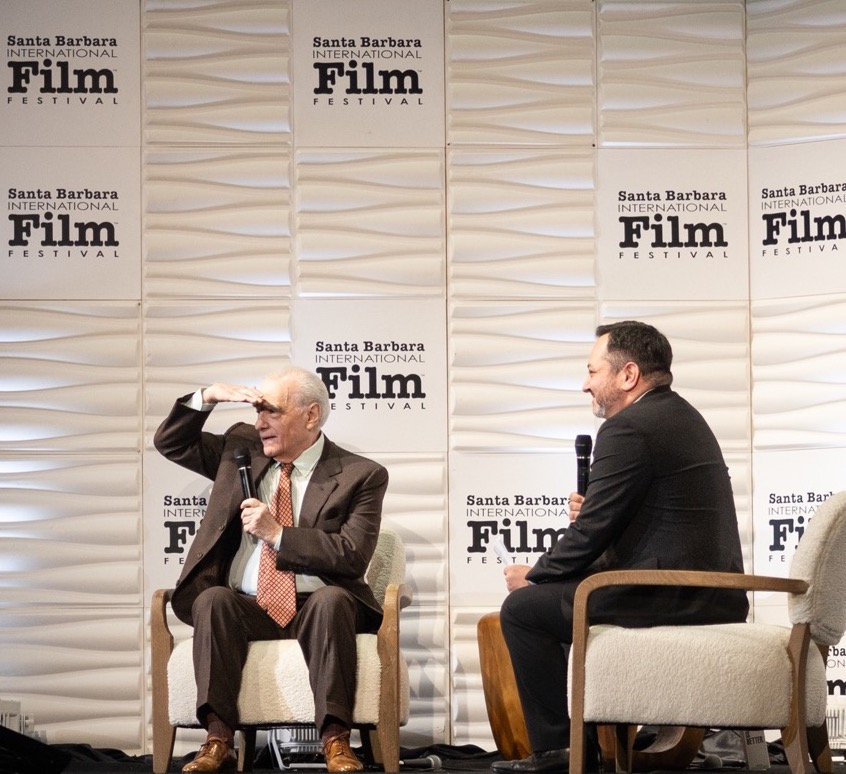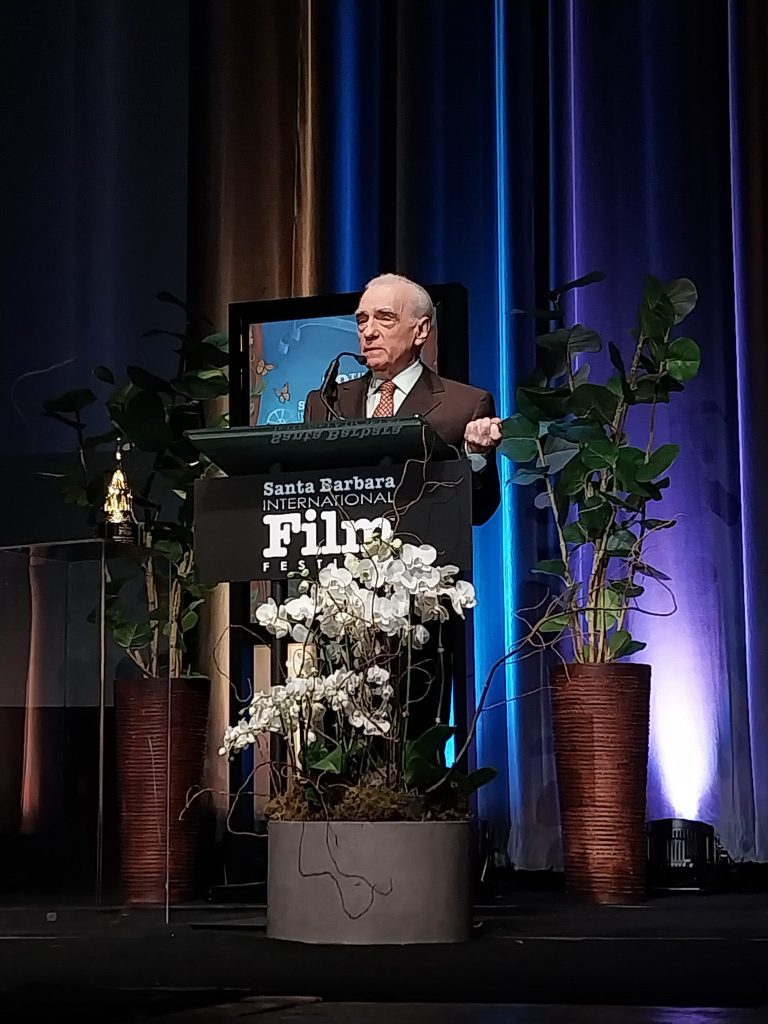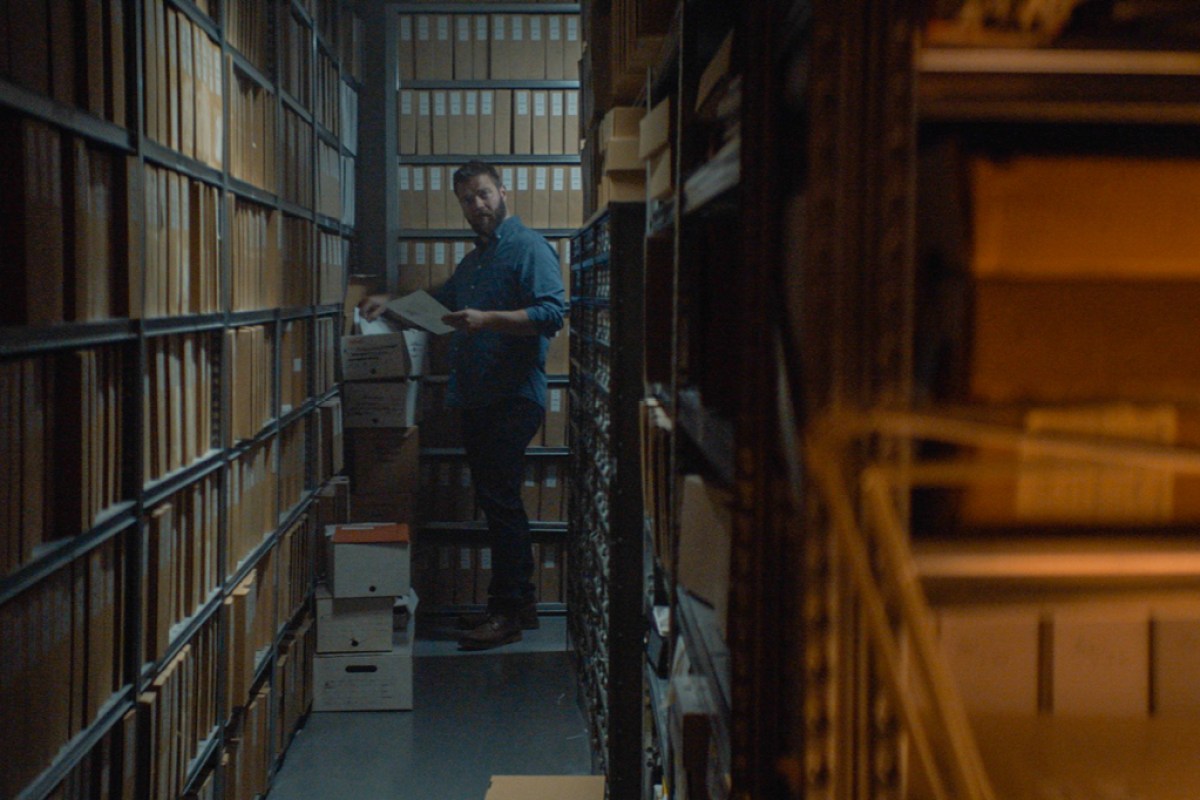Scorsese in the House, Quick Clips in SBIFF’s Second Wave
Cinema Saint Martin Scorsese Gave Audience to the Arlington’s “Outstanding Director” Show, and New Programming Menu Options
Cinema Saint Martin Scorsese Gave Audience to the Arlington’s “Outstanding Director” Show, and New Programming Menu Options

Martin Scorsese, the greatest living director in America and beyond, has graced SBIFF on numerous occasions, and none of them were just a sympathy vote. The welcome mat is always out for this supreme cinematic artist, and his part in the “Outstanding Director” night at the Arlington was particularly well-earned in connection with the masterful and Oscar-nominated Killers of the Flower Moon. (See Leslie Dinaberg’s full report here.)
Hollywood Reporter’s Scott Feinberg seemed understandably awed and respectful whilst interviewing the man behind Taxi Driver, Raging Bull, Casino, Wolf of Wall Street, Last Temptation of Christ, The Irishman, Silence and too many others to mention here. All the huzzahs aside, Scorsese always appears as the humble and engaged workman in cinema with no time or patience to rest on laurels. Even at 81, he’s soldiering forward, as the one-time priesthood aspirant is now working on his second movie about our man Jesus Christ.
Among other topics, he spoke about his 50-year association with his “muse” Robert DeNiro, noting that “his sensitivity taught me a lot. I also learned to trust him. We developed a trust, which culminated in Taxi Driver.” He also recounted that, under studio pressure, the famous “you talkin’ to me?” scene before a mirror was improvised by DeNiro.
Scorsese also paid respects to another frequent acting “muse,” Leonardo DiCaprio, and editor Thelma Schoonmaker, his Oscar-ized right hand person in the editing room since 1980’s Raging Bull, who he has known since the early 1960s. She was, he said, “not in the machine of the filmmaking community. She had a scene of not being affected by other films or trends.”
As SBIFF exec director Roger Durling bemoaned in his award presentation, Scorsese has ten Oscar nominations but only one, for The Departed. But Scorsese insisted that “the real gift was getting to make the films.”

In recent years, the director’s night has entailed a gathering of some of the greatest artists of the Oscar season moment, but last night’s event wisely focused more sharply on two dominant figures — Scorsese and fast ascending French auteur Justine Triet, creator of the remarkable Anatomy of a Fall. Now in the Oscar waiting game and only the third woman director to win Cannes’ Palme d’Or prize, Triet spoke in halting English about her powerful film, an existential mystery and trial saga with gender roles reversed, and one of the great dog roles of the year, played by Snoop.
In a weird way, Anatomy was one of 2023’s most music-driven films, not in the sense of a literal score, but the recurring appearance of three pieces of music, two classical piano pieces and the bracingly loud sound of an instrumental version of 50 Cents’ “P.I.M.P.” Ironically, Triet explained that she originally wanted to use a song by Dolly Parton for that part, but couldn’t get the rights. But the obnoxious “P.I.M.P.” track more than did the trick.
It turns out that there is more than one remedy for having gorged on too many serious, realistic and aesthetically challenging films in the course of a festival-goers day. The standard Rx might be a frothy French film or a giddy Brit comedy such as the deliciously potty-mouthed Wicked Little Letters. Or try this one on for size: a ripe item from the Icelandic horror genre. From that world comes Cold, a riveting ghost story which effectively draws us into its sinister plot web and reboots the film-gorged brain quite nicely. Or wickedly.
Director Erlingur Thoroddsen knows how to walk that critical line between rational, plausible reality and shattery forces which creep around a complex narrative and deliver just enough bump-in-the-night shock tactics to keep us awake. What also keeps us awake is the mental effort of tracing the tangled storylines, between the contemporary life of a social worker and his daughter — grieving over the recent death of their wife/mother — and a seemingly haunted wayward boys home back in 1984. There are surprise twists and narrative backflips all along the way, giving this horror film greater intrigue and cinematic integrity than your standard shock genre outing.
Cold is, indeed, cold, not to mention cinematically cool.

We are now in the second wave of film titles in the festival’s programming arc, with new meat offered to our hungry film appetites. What follows is a series of brief recommendations for films I’ve been able to screen ahead of time.
The Tundra Within Me (Norway, director Sara Margrethe Oskal). This involving Norwegian film takes us to the extreme north of Lappland, where an artist from the town has warily returned home after living in Oslo. There, she takes up with a reindeer herder and faces her own “inner Tundra” from her earlier life as a reindeer tender, grappling with the question of whether to stay or go. Beyond the details of the narrative and its tensions, the scenery and culture of the Sami region, plus the hypnotic sound of joiks being sung exerts its own allure onscreen.
The Last Daughter (Australia; directors Brenda Matthews, Nathaniel Schmidt). A nuanced and moving Australian documentary about an aboriginal woman and her siblings who were part of a shameful program of relocating aboriginal children into white families, without cause. Although returned to her rightful home, fond memories of her white family period draw her back in time and reconciliation with that branch of her past. The specific story is part of a larger tangled web of a story about the strained histories of aboriginal life and the impact of white settlers’ displacement. [Editor’s Note: This documentary also was awarded the ADL (the Anti-Defamation League) of Santa Barbara/Tri-Counties Stand Up Award, see story here.]
Rickerl (Austria, director Adrian Goiginger). This wonderful shaggy musician/dog tale finds a raw folky troubadour whose fates in the music business have dwindled alongside his relationship with his ex-wife and his deep desire to be a good father to his young son. Jobs in a mortuary and a porn shop don’t pan out, and booze fuels misbehavior. He’s down but not out, and tinges of optimism and light line the path of his darker turns, especially through the agency of his innocent son. A final song of hope gives us a warm glow of the same.
Sun, Apr 28 6:00 PM
Santa Barbara
Thu, May 02 5:00 PM
Santa Barbara
Sat, May 04 10:00 AM
Lompoc
Sat, Apr 27 11:00 AM
Santa Barbara
Sat, Apr 27 3:30 PM
Santa Barbara
Sat, Apr 27 8:00 PM
Santa Barbara
Sun, Apr 28 11:00 AM
Santa Barbara
Wed, May 01 7:30 PM
Santa Barbara
Thu, May 02 5:00 PM
Santa Barbara
Thu, May 02 5:00 PM
Santa Barbara
Fri, May 03 4:00 PM
Santa Barbara
Fri, May 03 8:00 PM
Santa barbara
Sat, May 04 10:00 AM
Solvang
Please note this login is to submit events or press releases. Use this page here to login for your Independent subscription
Not a member? Sign up here.
You must be logged in to post a comment.